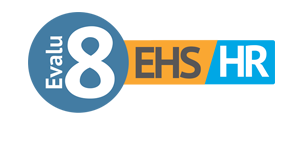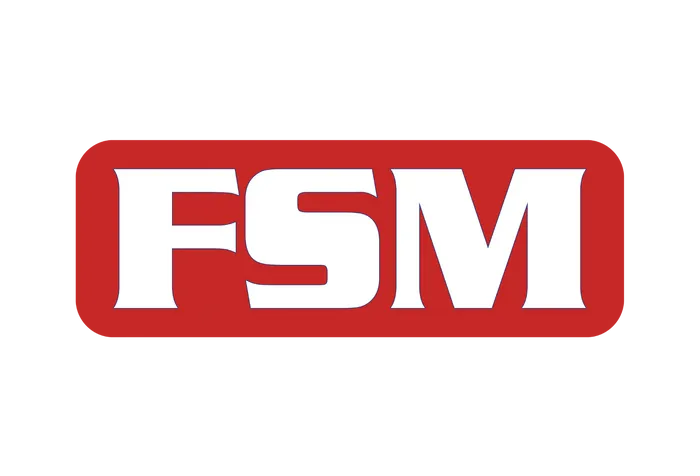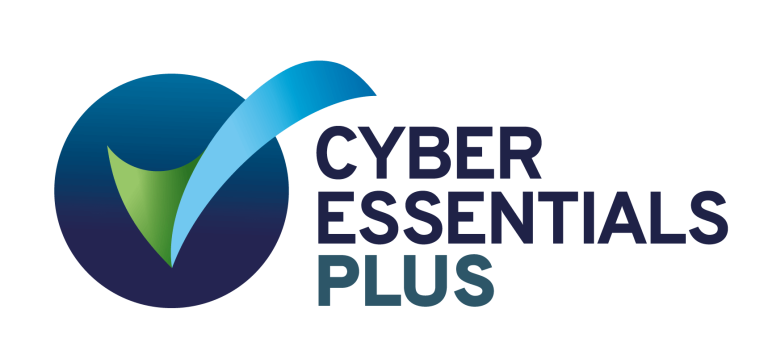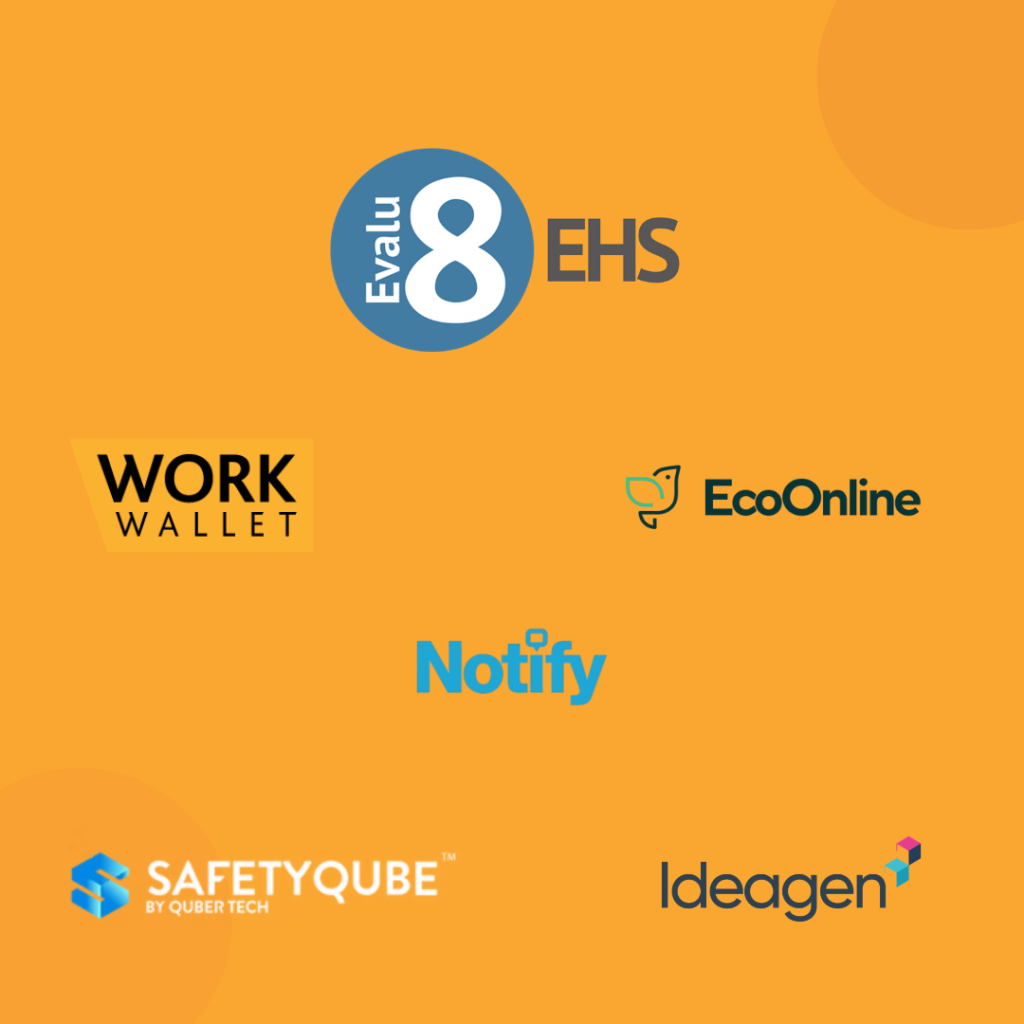
Choosing the right EHS software is essential for UK warehousing and logistics operators striving to maintain compliance, manage risk, and streamline safety procedures. With evolving HSE regulations, COSHH requirements, and ISO standards, an effective EHS management system can make all the difference in reducing incidents and improving operational efficiency.
But with so many options available, which software is the best fit for your warehousing or 3PL business?
In this guide, we compare the top 6 EHS software solutions for UK warehousing and logistics in 2025, evaluating their features, compliance capabilities, and suitability for cold storage, retail DCs, and third-party logistics providers. Whether you need a comprehensive all-in-one platform, a mobile-first inspection tool, or advanced reporting dashboards, this list will help you make an informed decision.
Helpful summary
Overview: This article, brought to you by Evalu-8 EHS, offers a detailed comparison of the top 6 EHS software platforms tailored for UK warehousing and logistics in 2025. It examines core features, advanced capabilities, pricing approaches, and potential limitations across environments such as 3PLs, retail distribution centres, and cold storage.
Why Trust Us: At Evalu-8 EHS, we specialise in supporting UK businesses with flexible, modular safety software that meets real-world compliance needs. Our team understands the unique hazards of forklift operations, manual handling, cold exposure, and high-pressure cleaning in logistics facilities, and what managers actually need from their EHS tools.
Why It Matters: With rising regulatory scrutiny and growing focus on safety culture, the right EHS software can mean the difference between reactive compliance and proactive risk management. Getting this decision right saves time, reduces lost-time incidents, and ensures consistent safety performance across multiple shifts and locations.
Action Points: Use this guide to assess which EHS platform aligns with your warehouse or logistics operation’s size, complexity, and compliance requirements. Whether you need rapid incident reporting, mobile-friendly checklists, or in-depth analytics on forklift collisions and COSHH use, this article will help you move forward confidently.
Evalu-8 EHS: Best EHS Warehouse & Logistics Software
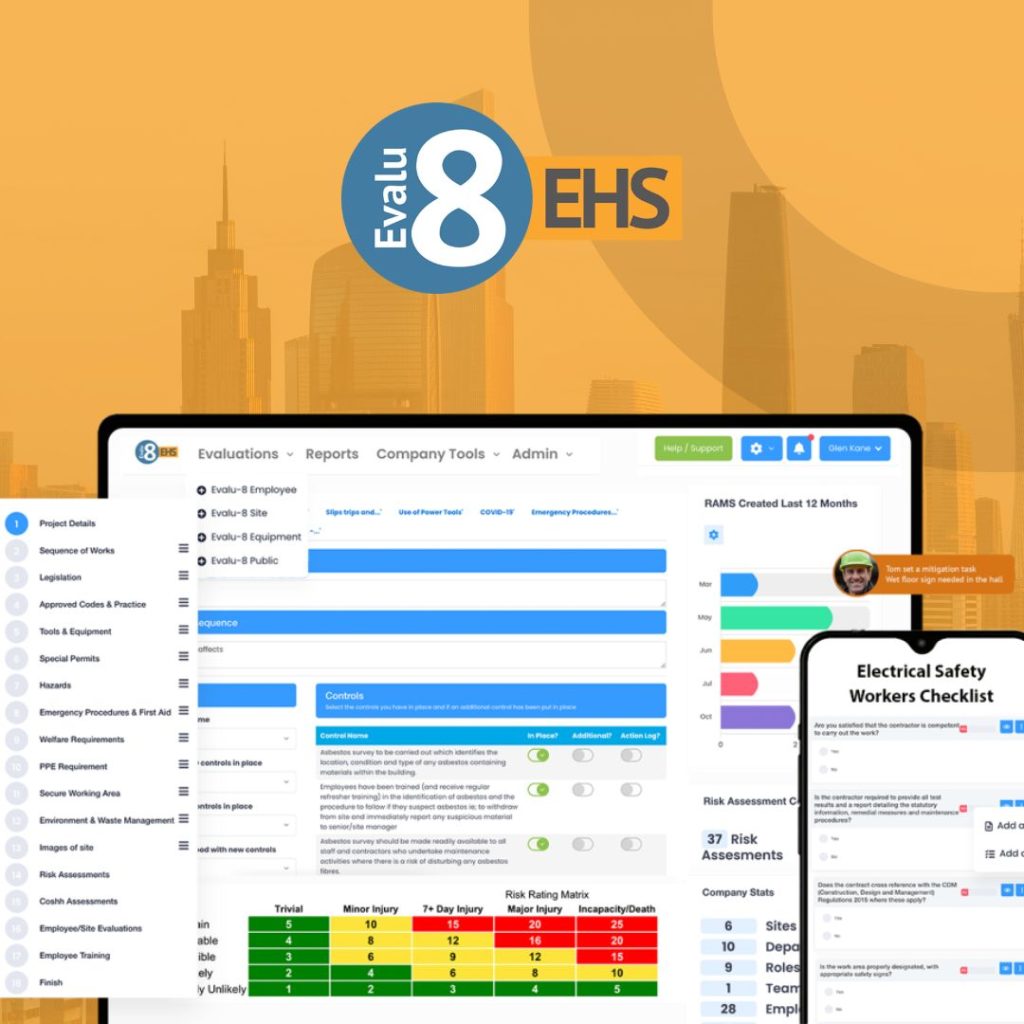
Why Evalu-8 EHS stands out
Evalu-8 EHS is a modular, all-in-one health and safety platform built for UK businesses. While many solutions focus on audits or incident reporting alone, Evalu-8 delivers a unified system that covers everything from RAMS to fatigue risk management. It scales from single-site operations to large DC networks, making it a top choice for warehousing and logistics teams that need both breadth and depth in safety tools.
As Seen in
Core Features
Risk Assessments: Create, assign, and review risk assessments for forklift operations, racking collapse, and manual handling. Templates and built-in controls accelerate creation.
RAMS: Generate and store task-specific RAMS for loading/unloading, cold store procedures, and maintenance. Sign-off tracking ensures every shift acknowledges before work begins.
COSHH Management: Create, store, and monitor COSHH assessments for refrigerants, battery acid, floor cleaners, and sanitisers. Automated review reminders alert managers of expiring data.
Equipment & Asset Management: Track forklift pre-shift checks, dock leveller maintenance, barrier integrity, and PPE inspection schedules. Photo uploads validate completion.
Accident & Incident Reporting: Log collisions, slips, crush injuries, and near misses instantly via desktop or mobile. Customisable workflows guide investigations and corrective actions.
Safety Audits & Inspections: Build pre-shift checklists for housekeeping, racking audits, and cold store checks. Assign actions, attach photos, and track version history.
Training Management: Maintain a digital training matrix, track expiry dates for manual handling and forklift licences, assign eLearning, and store certificates centrally.
eSignatures & Document Control: Digitally sign inductions, COSHH sign-off, and manual handling RAMS. Store safety policies and procedures with version control and access permissions.
Mobile App: Workers can access documents, complete forms, conduct inspections, and report incidents on-the-go, even in low-connectivity zones.
Advanced features
Fatigue Risk Management: Especially valuable for 24/7 operations, with tools to assess shift patterns and flag fatigue risks in real time.
Multi-site Management: Group data by warehouse or distribution centre for consolidated oversight and trend analysis across regions.
Real-time Dashboards: Customisable dashboards display live data on incidents, overdue actions, training gaps, and inspection statuses.
Automation & Alerts: Assign recurring tasks (e.g. weekly forklift checks), with automatic alerts for overdue actions or expiring certificates.
Integration Capabilities: Connect to HR and ERP systems for single sign-on and data consolidation (e.g. linking asset records from maintenance software).
Explore Evalu-8 EHS
Pricing
Core modules start at £2.50 per user per month. Add-ons are available such as RAMS, COSHH, Audits and Inspections and more.
Pros & cons
Pros:
Affordable and scalable for small to large logistics operations
Comprehensive all-in-one platform covering every major EHS area
Mobile app enables real-time reporting even in low-connectivity zones
Automated task reminders reduce missed inspections and actions
Strong UK-based support and regular product updates
Cons:
No built-in eLearning content library (SCORM upload required)
Advanced custom reporting may require additional configuration
Onboarding and configuration can be resource-intensive for smaller teams
Notify
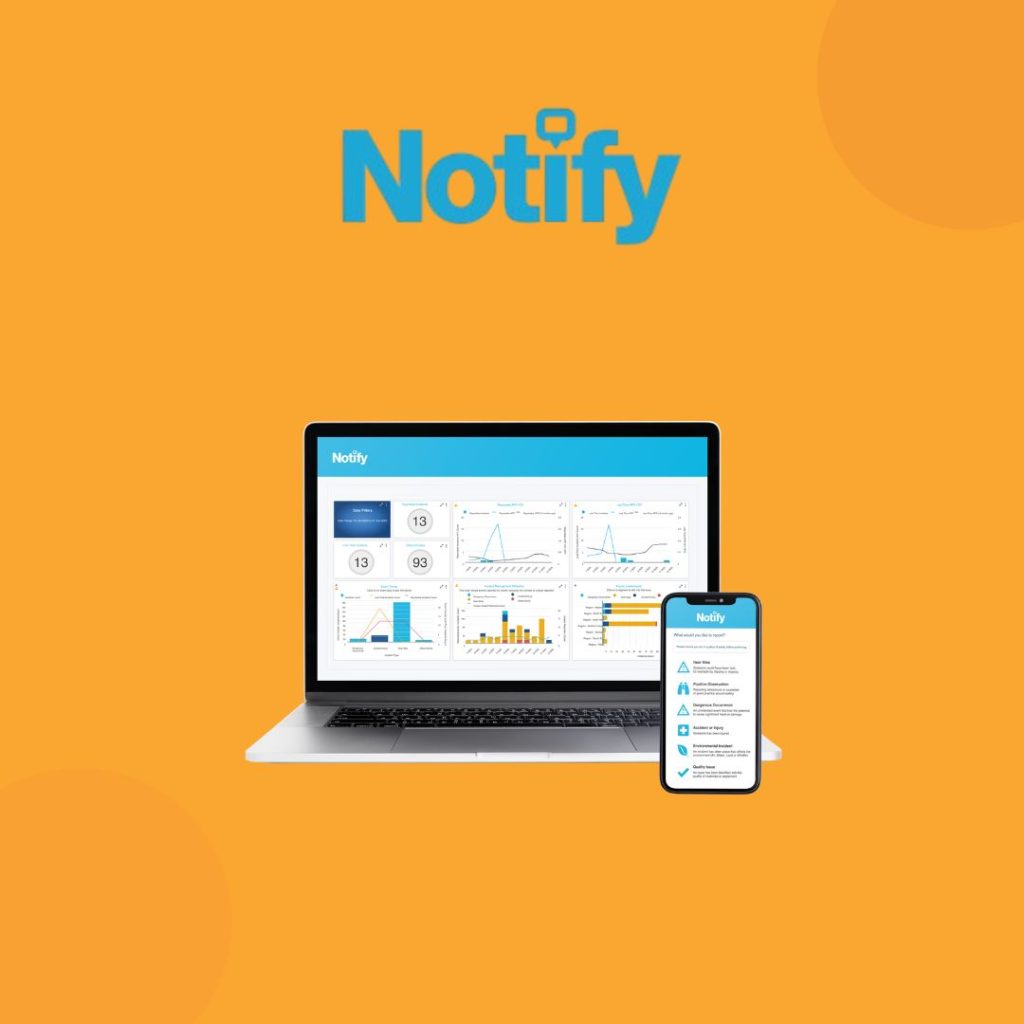
Notify is a lightweight, mobile-first EHS app focused on real-time incident reporting, task management, and alerts. It excels in environments where speed and simplicity matter most. However, it lacks the depth of document control and advanced analytics some logistics operations require, making it a better fit for small to mid-sized warehouses prioritising rapid response.
Core features
Incident & Hazard Reporting: Staff can report collisions, spills, and near misses with geo-tagged photo evidence. Templates ensure consistent data capture.
Task Assignment & Tracking: Create tasks for returned actions (e.g. barrier repairs, housekeeping follow-ups) and assign to specific users with due dates.
Push Notifications & Alerts: Immediate notifications for reported incidents, overdue tasks, or safety bulletin updates keep teams aligned.
Checklists & Inspections: Build simple pre-shift checklists for forklifts, racking, and PPE. Staff tick off items and attach photos.
Mobile-First Interface: Designed for rapid data entry on any smartphone. Offline mode allows reports in low-connectivity zones with automatic sync when back online.
Advanced features
Custom Workflows: Configure escalation rules (e.g. if an incident is not closed within 4 hours, notify a manager).
Dashboard & Analytics: Basic dashboards show incident counts, open tasks, and compliance metrics.
Integration with Slack & Teams: Alerts and summaries can be posted directly into collaboration channels for broader visibility.
Third-Party System Hooks: Connect to asset management or ERP systems via API for automated data exchange.
Constraints and functionality gaps
Limited Document Control: Does not offer full document storage or versioning. Policies and procedures must be hosted elsewhere.
No In-Depth Asset Management: Basic asset tagging exists, but no comprehensive maintenance scheduling. Larger operations may still need a separate CMMS.
Simplified Reporting: Dashboards cover high-level metrics, but deep trend analysis (e.g. root cause linking over multiple sites) is not available.
COSHH Module Lacking: Includes generic hazard menus, but no dedicated library or automated reminders for COSHH review.
Pricing
Notify operates on a per-user, per-month subscription. Pricing details are tiered by user count and feature set. Small teams can start with a basic plan around £5 per user per month. Larger warehouses with advanced workflows should contact sales for custom pricing.
Pros & cons
Pros:
Intuitive, mobile-first design for rapid incident reporting
Offline capability ensures no data loss in low-connectivity areas
Custom workflows and push notifications keep teams aligned
Integration with collaboration tools like Slack and Teams
Cons:
Lacks advanced document control and versioning
Minimal asset management features requires separate CMMS for detailed maintenance
Simplified reporting not suitable for deep root cause analysis
Safety Qube
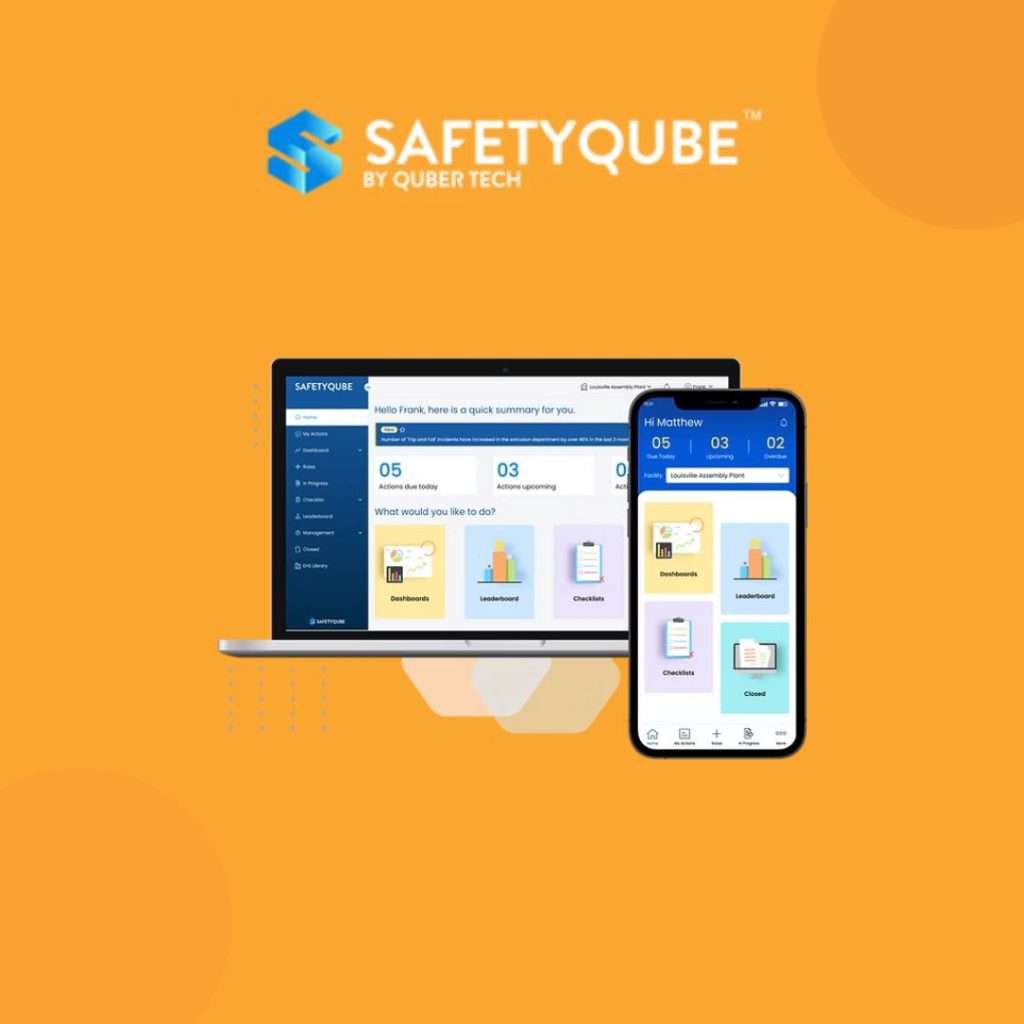
Safety Qube is a modular EHS platform offering role-based access and configurable workflows. It shines in medium to large logistics enterprises needing strict user permissions and audit trails. However, its initial setup can be intricate, and mobile usability is not as streamlined as some competitors.
Core features
Risk Assessments: Configurable templates for forklift operations, cold store work, and manual handling. Granular user permissions define who can create, review, or approve.
RAMS & Permit to Work: Issue task-specific RAMS for loading docks, racking inspections, and cleaning procedures. Permit workflows include approval chains and digital signatures.
COSHH Management: Create comprehensive COSHH assessments for refrigerants, cleaning agents, and battery acid. Automated review reminders and compliance dashboards ensure up-to-date data.
Incident & Near-Miss Reporting: Log incidents with photo attachments, assign investigations, and track corrective actions. Role-based dashboards show open and closed incidents per site.
Audits & Inspections: Build detailed checklists for housekeeping, racking audits, and forklift checks. Assign follow-up actions with escalation rules for overdue items.
Advanced features
Behavioural Safety Module: Capture safe and unsafe behaviours via mobile app. Use observations to drive focused training and reduce repeat incidents.
E-Learning Integration: While no built-in courses, integrates with popular LMS platforms to track completion of manual handling or forklift training.
Customisable Dashboards: Build role-specific dashboards for warehouse managers, H&S coordinators, or regional directors. Embed KPIs like incident frequency, MHE failure trends, and audit scores.
Offline Functionality: Mobile app works in offline mode, syncing data when connectivity returns essential for remote or underground storage areas.
Constraints and functionality gaps
Complex Initial Setup: High level of configurability leads to lengthy onboarding. Dedicated project management and internal resource allocation are necessary.
Less Intuitive Mobile Interface: Mobile features exist but can feel clunky compared to more modern, streamlined apps. Users occasionally report navigation slowdowns.
Limited Native Asset Management: While inspections can be linked to assets, there is no full CMMS module. Warehouses needing detailed maintenance schedules may need a separate solution.
Reporting Performance: Custom dashboards are powerful but can be slow to load if a large volume of historical data is present.
Pricing
Safety Qube uses a modular pricing model, charging per user per month plus additional fees for advanced modules (behavioural safety, COSHH). Entry-level packages start at approximately £2 per user per month for core modules. Warehouses requiring multiple modules should request a tailored quote.
Pros & cons
Pros:
Highly configurable and role-based access controls
Robust COSHH and permit to work workflows
Behavioural safety module promotes proactive engagement
Offline mobile capability ensures data capture in remote areas
Cons:
Complex setup and onboarding process
Mobile interface not as user-friendly as some alternatives
Limited native asset management may require separate CMMS integration
Reporting dashboards can be slow with large data volumes
EcoOnline

EcoOnline is a cloud-based EHS platform renowned for its chemical safety tools and extensive COSHH library. For warehouses handling refrigerants, floor cleaners, and battery acids, EcoOnline provides unmatched chemical management. However, its focus on COSHH comes at the expense of deeper asset tracking and may feel overly complex for smaller operations.
Core features
COSHH & Chemical Safety: Comprehensive library of hazardous substances, including refrigerants, cleaning agents, and battery fluids. Automated review reminders and MSDS access ensure compliance.
Risk Management: Configurable risk assessment templates for forklift use, refrigeration maintenance, and cold store work. Built-in controls guide users through hierarchy of controls.
Incident & Accident Reporting: Log incidents, near misses, and environmental spills. Assign investigations, track corrective actions, and generate incident trend reports per site.
Audit & Inspection Management: Schedule and conduct site audits for racking inspections, housekeeping checks, and PPE compliance. Status tracking and version history provide full audit trails.
Training & Competency Tracking: Assign training, track completion, and log certificates for manual handling, forklift licences, and COSHH modules. Automated expiry alerts help prevent lapsed qualifications.
Advanced features
Emergency Preparedness & Response: Build structured emergency plans for refrigerant leaks, battery fires, and confined space incidents. Schedule drills and manage debriefs.
Contractor Management: Track external service providers’ qualifications, insurance, and risk assessments. Ensure contract cleaners and maintenance teams meet site standards.
Real-time Dashboards & Analytics: Customisable dashboards show chemical compliance rates, overdue actions, and incident trends across multiple warehouses.
Lone Worker Support: Integrated tools and third-party device connectivity ensure isolated workers in quiet night shifts can be monitored and contacted quickly.
Constraints and functionality gaps
Pricing Transparency: No standard pricing is published online. Warehouses must request a tailored quote, which can slow evaluation.
Learning Curve: Due to rich functionality, some users report moderate onboarding time to unlock full potential. Admins require dedicated training to set up workflows.
Mobile App Limitations: While mobile supports inspections and reporting, some advanced features (e.g. chemical register edits, dashboard customisation) are desktop-only.
Asset Management: Basic asset tracking exists, but no full CMMS scheduling. Warehouses needing detailed maintenance logs and service histories may need an external system.
Pricing
EcoOnline uses a modular pricing model based on features and user count. Rather than fixed packages, the platform is quoted per warehouse operation. Entry-level packages for small sites may start around £3 per user per month for basic COSHH and incident modules. Larger distribution centres should request a custom proposal.
Pros & cons
Pros:
Leading COSHH and chemical safety tools with extensive substance library
Strong audit and inspection functionality for warehouse compliance
Emergency preparedness module helps plan for chemical incidents
UK-based support and dedicated customer success teams
Cons:
No published pricing requires quote for budgeting
Onboarding can be time-intensive due to feature depth
Mobile app lacks some desktop-only features
Basic asset management requires external CMMS for detailed maintenance
Work Wallet

Work Wallet is a mobile-first EHS platform designed for fast adoption. It excels in assigning tasks, delivering digital inductions, and managing on-site compliance. Its simplicity makes it a great choice for operators prioritising quick mobile reporting, though it lacks some advanced analytics and chemical safety depth of other solutions.
Core features
Accident & Incident Reporting: Instant reporting of collisions, slips, and near misses. Photo attachments and location data ensure accurate records.
Audits & Inspections: Build mobile-friendly checklists for forklift checks, racking audits, and cold store housekeeping. Generate brandable reports.
Risk Assessments: Craft, manage, and review risk assessments for manual handling, cold storage, and chemical cleaning tasks. Simple interface helps non-specialist staff.
Safety Briefings & Toolbox Talks: Deliver digital safety briefings and track attendance. Ensure that all shift workers acknowledge key safety messages.
Digital Inductions: Streamline induction process for new or temporary staff. Ensure staff review site-specific RAMS and COSHH prior to starting tasks.
Permit to Work: Manage hot works, confined space, and maintenance permits digitally. Approvals are routed to managers via mobile.
Job Management: Plan, assign, and track daily tasks for cleaning, maintenance, and equipment checks. Real-time updates show which tasks remain open.
Advanced features
Safety Cards: Issue digital safety cards to employees, consolidating qualifications, training records, and competencies in one accessible location.
ID & Training Records: Manage staff IDs, licences, and training records for forklift, manual handling, and chemical safety. Automated expiry alerts prevent lapses.
Contractor Gateway: Provide contractors with a portal to upload and manage their compliance documents, ensuring external teams meet site requirements before mobilising.
Constraints and functionality gaps
Limited Integration Options: Integrates primarily with Azure Active Directory. Warehouses using multiple systems (ERP, CMMS) may need custom API work.
Basic Chemical Management: Includes general COSHH forms, but lacks an extensive hazardous substance library. Advanced chemical safety workflows are limited.
Simplified Analytics: Dashboards are user-friendly but not designed for deep trend analysis. Larger DCs may find reporting insufficient for board-level metrics.
Mobile-First Trade-offs: Mobile interface is smooth, but some advanced workflows (e.g. document version control) are desktop-only.
Pricing
Work Wallet uses a modular, per-user pricing model starting from £1 per user per month. Basic packages include incident reporting, audits, and risk assessments. Additional modules (digital inductions, contractor gateway, safety cards) add to the cost. Contact sales for a tailored quote.
Pros & cons
Pros:
Intuitive mobile-first design for rapid field use
Quick inductions and toolbox talks ensure new staff compliance
Digital permit to work reduces paper processes
Contractor gateway streamlines external supply chain compliance
Cons:
Limited integrations may need custom development for ERP or CMMS
Basic COSHH management absent extensive chemical library
Simplified analytics may not meet needs of data-driven logistics leaders
Some advanced tasks only available on desktop
Ideagen

Ideagen EHS is a unified platform that combines health and safety, quality, and environmental management. For logistics operators pursuing ISO 9001 and ISO 14001 alongside HSE compliance, Ideagen offers strong multi-standard support. However, its broad focus can lead to complexity and a learning curve for smaller warehouse teams.
Core features
Incident Management: Report, track, and analyse warehouse incidents, near misses, and damage claims. Custom workflows guide investigations and root cause analyses.
Audit & Inspections: Schedule and execute audits and inspections for racking, forklifts, housekeeping, and cold store hygiene. Track corrective actions with due dates.
Risk Assessment: Identify, evaluate, and mitigate risks related to manual handling, refrigerated environments, and chemical exposures. Structured templates support consistent assessments.
Training Management: Manage training programmes, track expiry dates for forklift licences, manual handling, and COSHH qualifications. Automated reminders prompt renewals.
Document Management: Store policies, procedures, and safety bulletins in one secure repository. Version control ensures staff access the latest documents.
Compliance Management: Monitor regulatory requirements (HSE, COSHH, ISO) and generate compliance reports for internal audits or external inspections.
Advanced features
Behaviour-Based Safety (BBS): Encourage proactive safety culture with tools to record safe and unsafe behaviours. Use data to focus coaching on at-risk activities.
EHS Reporting & Analytics: Real-time dashboards and customisable reports cover incident trends, audit scores, and training gaps across multiple warehouse sites.
Industrial Hygiene: Monitor cold store air quality, noise levels, and dust suppression metrics to protect worker health. Connect external sensors for continuous data logging.
Management of Change: Ensure changes to warehouse layouts, equipment, or processes are evaluated for risk and approved before implementation.
Constraints & functionality gaps
Complex Initial Setup: Due to wide scope, onboarding requires significant time and project management. Smaller teams may find initial configuration overwhelming.
Learning Curve: New users often need structured training to navigate custom workflows and complex reporting tools effectively.
User Interface: Some users note the interface can feel dated and less intuitive compared to newer mobile-first apps. Regular updates are improving usability, but a learning period remains.
Mobile App Feature Gaps: While key data entry functions exist, some advanced modules (e.g. industrial hygiene sensor integration) require desktop access.
Pricing
Ideagen EHS follows a bespoke pricing model based on modules and user count. Pricing is tailored to each logistics operation’s size and compliance scope. Interested warehouses should contact Ideagen directly for a custom quote.
Pros & Cons
Pros
Broad suite combining safety, quality, and environmental modules
Strong incident investigation and BBS tools support proactive culture
Industrial hygiene features help manage cold store and dust risks
Supports multi-standard compliance (ISO 9001, ISO 14001, ISO 45001)
Cons
Significant configuration time and learning curve for smaller teams
User interface can feel dated compared to newer mobile apps
Some advanced features require desktop access, limiting mobile usability
Bespoke pricing means no transparent entry-level costs
Final Thoughts
Choosing the right EHS solution for warehousing and logistics is about balancing robust compliance tools with ease of use and field accessibility. Evalu-8 EHS delivers a comprehensive, modular system tailored to high-pressure environments, while Notify excels at real-time incident alerts and SafetyQube offers strong data analytics. EcoOnline’s chemical safety modules and Work Wallet’s mobile-first design support everyday tasks, and Ideagen brings integrated quality management for larger operations. Each platform addresses core needs such as digital RAMS, COSHH tracking, inspections, and incident reporting in different ways. Assess your organisation’s size, budget, and specific hazards to determine which features matter most. With any of these tools in place, you can reduce incidents, improve visibility, and maintain compliance across all shifts and sites in 2025 and beyond.
FAQs
Look for tools that support digital RAMS, COSHH for refrigerants and cleaning agents, mobile-friendly inspections, photo-enabled incident reporting, and equipment inspection scheduling.
Absolutely. Warehouses often have low-connectivity zones and night shifts. A mobile-first solution with offline capabilities ensures staff can complete audits, incident logs, and COSHH sign-offs on the spot.
Cold storage sites handle unique hazards like refrigerants and sanitising chemicals. A robust COSHH module should include a library of these substances, automated review reminders, and tie directly into relevant tasks.
Most organisations see a return within 6-12 months through fewer lost-time incidents, faster audit turnaround, improved compliance, and reduced paperwork. Live data dashboards and automated alerts accelerate savings.
